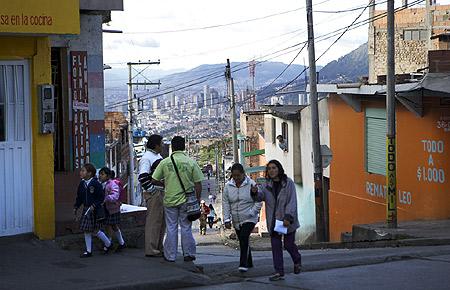In the ten-year period between 1995 and 2005, Colombia's capital city, Bogotá, experienced a virtual miracle. Once a city characterized by terror, crime and one of the highest murder rates in the world, Bogotá became a role model for urban planners around the world.
"The film's cinematographer, one of Colombia's most experienced documentary photographer, later told me that we had filmed in some locations where he never would have imagined setting foot – and walking away alive."
Behind this transformation were two visionary and forward-thinking mayors, Antanas Mockus and Enrique Peñalosa, who, applying drastically different methods, tackled the inhabitants' behaviour and the city's infrastructure. Using abundant archive material, supplemented by present day footage and interviews, the Bogotá documentary tells the story of the city's fantastic metamorphosis.
"Because Mockus and Peñalosa are public figures, considerable archive material exists, and digging it up was one of the most demanding tasks involved in making this film."
Has seeing the story from the outside been an advantage or disadvantage for you?
"For the most part, I think it has been an advantage. The 'thesis' presented by the film is that neither Mockus or Peñalosa alone can take credit for what has happened, but that it was Bogotá's great fortune that these two mayors happen to come in succession. Mockus is first and foremost a thinker, while Peñalosa is a doer, and in this way they compliment one another. And as an outsider, it has been natural for me to observe this project's success as a result of their shared contributions.
When one hears about the level of violence and corruption in Colombia, one can't help but wonder how Mockus and Peñalosa managed to survive their campaigns.
"There are politicians who are 'removed' in Colombia, and I can't say why these two have managed to survive. But it may have something to do with the fact that Bogotá, despite all of its problems with crime, drugs and slums, is also a very liberal city, with a well educated middle class and a rich cultural life and some of South America's top universities.
"The real secret behind Mockus and Peñalosa's success is that they are two people characterized by extreme honesty and integrity in everything they do. They are two leaders who have the necessary courage to stay true to their visions, even when the opinion polls go against them. Unlike other politicians who are controlled by strategies and tactics, they have not been driven by a lust for power, only by their ideas and philosophies. And if there is a lesson to be learned by their story, it must be that the change they have managed to bring about could never have come from the traditional political system. It could only have come from the outside."
What was the most difficult thing about filming in Bogotá?
"Colombia is a very segregated society, and there are still slum districts in Bogotá where it is not safe to walk around. I worked with a team consisting of seven Colombians, and it was actually something of a challenge to get them to work in some of the more impoverished neighbourhoods. The film's cinematographer, one of Colombia's most experienced documentary photographer, later told me that we had filmed in some locations where he never would have imagined setting foot – and walking away alive."
With the large amount of archive material, this is a very different film than those you usually make. Has the fact that the story plays out in the past felt like a limitation?
I quickly arrived at the conclusion that the story itself was so strong and important, that it was not about bringing in all sorts of innovative stylistic tricks. I felt more obligated to communicate the story as clearly as possible, precisely because it isn't just a story about Bogotá, but a universal narrative about change that affects us all. The important thing about what has happened in Bogotá is that people haven't solved the problems by coming down hard and dishing out harder prison sentences, but by creating equality between all types of people in society and strengthening the individual's sense of responsibility. In short, it is about putting people in the center and creating happiness. And I am very happy to have been able to tell this story."

